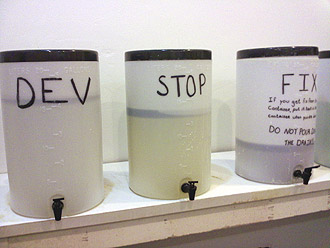Developing Infrared Film
So, you've shot your film! Most of the difficulty in infrared film is taking the pictures. Developing them is much like developing normal black and white film.
1. Equipment needed
Chemicals
You can develop infrared film in a basic black-and-white darkroom with no additional chemicals. Straightforward, right? You just need developer, stop, fix and a source of water.
As always, make sure your chemicals are fresh and diluted properly. Keep an accurate timer on hand. You don't want to destroy such expensive film!
Tanks and reels
Infrared film can be reeled onto a plastic or metal reel. The tank can also be a standard one, but make sure all the pieces (tank, top, rubber ring, spout cover and spool) fit together tightly and you have a rubber ring or other guard against light around the edges. The tiniest light leak in a tank can ruin infrared film.
p>2. The process
Special requirements
Keep in mind that infrared film is extremely light sensitive. You will not be able to see every light leak.
Reeling the film
Before you start reeling your film, check the closet or changing bag for any light leaks.
Open the film canister in complete darkness with a can opener, unwind the film and cut off the film spool with scissors.
Load the film onto a metal or plastic reel. Plastic is easier for beginners: slide an end of the film into the outer groove of the reel and turn it back and forth to feed the film into the reel. This can be difficult in the dark, so you might want to practice beforehand.
Place it in the tank and secure the top tightly before turning on the lights.
Developing
Once the film is safely inside the tank, you can develop it. Common black-and-white developers like Kodak D-76 work fine. The developer should be between 65 and 75 degrees Fahrenheit.
Development times depend on the developer used, film speed and temperature. For specific development times, search digitaltruth's Massive Dev Chart. Here's an overview of development times for infrared film using D-76 (stock dilution) at room temperature:
- Rollei Infrared 400: 6 minutes
- Maco/Efke 820: 8 minutes
- Ilford SFX 200: 10 minutes
Once you've figured out your film's development time, pour the developer into the spout at the top of the tank. Place a spout cover on the tank.
Invert and jiggle the tank every 30 seconds. When the development time is up, pour it out.
Stopping
After pouring out the developer, pour in stop bath the same way and wait 30 seconds to a minute. You can also pour running water into the spout if stop bath isn't available. Agitate the tank the entire time.
Pour the stop out. Don't open the tank yet! It isn't light safe until after you fix it.
Fixing
Now, pour your final chemical -- fix -- into the spout and wait 5 to 10 minutes. Fix allows you to view the film in normal light and preserves the negatives.
After you have fixed the film, the tank can be opened and you can see your negatives. Don't pull them off the reel yet.
Washing
Remove the top of the tank and let cold running water enter it for five minutes.
Drain the water and wash for a few more minutes. After you're done, pull the film off the real and hang the film to dry for a few hours.
